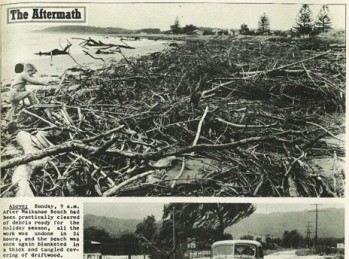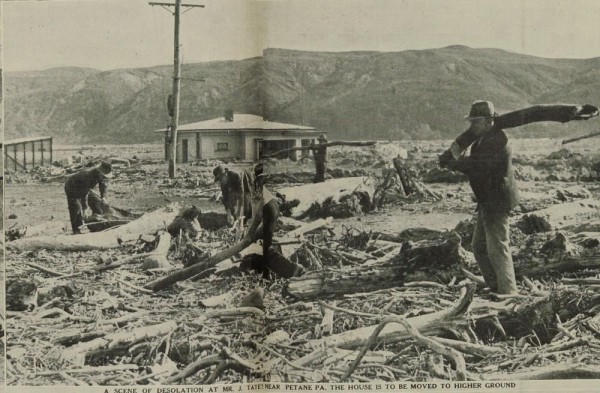Sections
27th February 2023 Newsletter
PRESIDENTS COLUMN

What a fortnight. Forestry has never been so much in the spotlight and I am pretty sure we will face change. Whilst there is no doubt we can make some practice changes, I am also concerned we will be found the scapegoat and real changes required to protect the downstream effects won’t occur. How we get this messaging out will be difficult and delicate.
Our view on the announced Ministerial Review is it is not broad enough. All land use from the top of the mountains to the sea needs to be reviewed. The goal of the review must be how to mitigate the downstream effects of land use, to help build climate resilience and avoid the catastrophic impacts of extreme weather events associated with climate change such as that caused by Cyclone Gabrielle. This should include a review of decisions by councils on where to allow buildings and infrastructure to be built.
Most of us by now have seen the photos of whole hillsides falling into rivers and it did not matter what was growing on them, radiata, native, poplar, willow or grass. The actual cause here is geography and soil type. Nothing could stand up to the fury of this storm.
However forestry needs to recognise its role. For years we have complained of farming externalising their pollution (nitrogen, sedimentation, carbon etc) and now it is our turn to recognise our role and find ways to mitigate the effects. There has been a lot of discussion about retreat from sites and replanting in native, but no clear plan around how this would occur, who would pay and if it is even possible. Furthermore it must be recognised, just because the hills are covered in native does not mean no woody material will come down these rivers. We just need to see photos of earlier storms (pre exotic planting) to know this is true.
This is a time for the membership to stand up. Solving some of these issues should be our responsibility. We are the forestry professionals. We must present possible solutions, based on science, and we must not get angry or upset at media’s emotional attacks.
I have been in discussion with some in the media who are starting to look at the bigger picture, and I will continue these discussions as they form their ideas and write their stories. I am hopeful of a move in the media to look at the bigger picture now we are getting over the initial shock. However, if forestry denies any wrong doing then we will be ridiculed. We need to acknowledge our part and then let people know what changes we are making.
We must not be surprised if there is no immediate appetite for big picture solutions. People are grieving. It is natural reporters will focus first on what's right in front of them. But over time, hopefully we will find it easier to attract attention to the big picture concerns. Think back to the arrival of Covid. When we experienced the first deaths, there was no immediate appetite for a conversation about a re-set or improved infrastructure. People were grieving and people were fearful. That's what got reported. Over time, the focus shifted, just as it will with this event.
So my message to members everywhere, but particularly East Coast, Hawkes Bay, Northland and Coromandel; hang in there, I know you are doing it tough and feel like you are under attack. Stay professional, stick to facts. We will be heard.
As always I am available for a call or emails.
Thanks
James


REGISTRATION BOARD
From the Registrar
APPLICATION FOR REGISTERED MEMBER
The following Member has applied to become a Registered Member:
- Jacob Fairhall of Whangarei
SUCCESSFUL APPLICATION FOR REGISTERED MEMBER
The following Member is now a Registered Member:
- Peter Weblin of Rotorua
NOTICE OF 5 YEAR REGISTRATION REVIEW
The following Members are due for their 5-Year review of registration in 2023 and have not yet submitted their application;
- Steven Croskery of Masterton
- Erin Jeffrey of Rotorua
- Bob Pocknall of Napier
- Gareth Buchanan of Rotorua
- Julian Kohn of Gisborne
- Angus Malcolm of Richmond
- Kirsten Stuart of Christchurch
- Brett Gilmore of Napier
- Rene Weterings of Taupo
- Simon Rapley of Taupo
- Jeremy Waldegrave of Auckland
- Dennis Neilson of Rotorua
Any member of the NZIF has the right to object to an application. Any objection should be lodged with the Registrar registrar@nzif.org.nz within 20 working days of the first appearance (27 February 2023) of the notice in this newsletter, specifying the grounds for the objection.
Alan Bell, Registrar
NZIF Registration Board
registrar@nzif.org.nz
+64 27 444 7779
27 February 2023
News From the Registration Board
Forestry Professional Early Career Development Programme
With the approval of the NZIF Council at its 9 February meeting, the Registration Board is developing an Early Career Development Programme. The aim of this is provide a programme primarily for those members who have completed a qualification that is necessary for NZIF registration, but who do not yet have the five years of experience also required for registration. While primarily aimed at NZIF graduate members, it might also be useful to some student members who have embarked on further study, perhaps a degree involving research or to gain further qualifications in a specialist subject. Some Associate members could also find it attractive.
The Registration Board is currently finalising details of the programme. Enrolment in the programme is likely to be similar to applying for registration, but with the added requirement for the applicant to report on experience gained during each year, and for a review of the performance of the applicant supplied by their employer or mentor. Once a member in the programme meets the requirements for registration, they would be expected to apply for registration and would cease to be enrolled in it.
The Board will release further details on the programme as they are finalised and agreed by the Council and the Board.
Revised guidelines for referees
Applicants for NZIF registration or review of registration are required to ask three people to prepare a reference for them that is forwarded directly to the registrar as part of their application. References are confidential to the Board and provide it with valuable information that has not come directly from the applicant. The Board has revised the guidance for referees. Of particular importance is the reference to the Privacy Act 1993 has been replaced by reference to the Privacy Act 2020. The revised instructions can be found on the website at Read more
Increase in registration fees from 1st April 2023
The Council has approved an increase in fees associated with registration for the 2023/24 year. They are (all GST inclusive):
Application for NZIF registration and for the periodic review of registration is $200.
Annual NZIF registration fee is $240 which includes the $36.80 for MPI registration that NZIF will pass on to MPI for each NZIF Registered Member who needs to be recognised as a registered forestry adviser.
NZIF registered members also pay the same annual membership fee as ordinary members ($330) in addition to their registration fees.
MEMBERS VOICE
Following on from my opinion in this forum a couple of weeks back, the fallout from cyclone Gabrielle has far exceeded my expectations of worst outcomes. This has been a major weather event that will cost this country $billions, it has cost lives, and the longer-term emotional toll on battered people cannot be overestimated or ignored.
Calls for commissions of enquiry into land use practices, as I understand it at the time of writing, have been vehement in some quarters. I for one understand that, but unfortunately political response, in a wide sense of the phrase, has been somewhat muted and muddling. Some of these calls alarmingly have been restricted to forestry practices and if we go down that pathway I fear for the future of our industry in a number of regions of New Zealand. Our industry cannot afford for that to happen as the outcome is likely to be very damaging. We are already back pedalling on such things as wider social licence and carbon. As a longer-term participant in our forestry sector I feel the pain and suffer the embarrassment of having to continually explain myself and I do have to work hard to stay calm and collected.
I am now strongly of the opinion that an independent, and that means apolitical, commission of enquiry is not only warranted, but essential. This must review land-use decisions of the past 100 years, acknowledge the failure of some of those decisions, and hopefully leave us with better knowledge to face the next 100 years. Practices and impacts on all land-use in these vulnerable regions is core, as well as catchment management, engineering infrastructure and community safety that must all be addressed. Outcomes of such a review will form the framework of a plan for future generations to adopt and adapt as necessary.
New Zealand has had commissions of enquiry following previous disasters such as Erebus and building standards after the Christchurch earthquake etc. I believe there may have been one of sorts into the Tangiwai disaster.
My question for the powers that be is to consider where these previous disasters rate in relation to what we have just seen with Gabrielle, that being an easy answer, get on with the job. That call seems even more straightforward when we consider the opinions of the climate change experts, that these events will only become more frequent.
John Schrider
FNZIF Registered Forestry Consultant
Logging debris
Production forestry is in real danger of losing its social licence to operate in many areas because of logging waste being washed downstream. That much of the mud covering the land after the most recent catastrophic climate event originated from farm land is irrelevant to forestry’s licence.
Radiata generates woody material currently regarded as unmerchantable, some 15 % (plus or minus) of the gross volume. Thus a 10 hectare logging setting with 600 m3 per hectare recoverable volume will have upwards of 1000 tonnes of logging waste spread across the cutover or on the skids.
When a tree is felled using a chain saw, it lands with a thump and the stem breaks, on average at about two thirds of its length ( with considerable individual variation), often into several pieces above the first breakpoint that are too costly to extract on steep terrain. Provided the correct technique is used with care, mechanised felling can prevent breakage and the non merchantable part of the stem extracted attached to the main stem. The waste can be used as biofuel.
If this was carried out universally on steep country, there would no logging waste problem. Harvesting occurs at a relatively young age and provided there is no tree mortality, little down and dead debris prior to operations. However, the devil is in the detail and the economics uncertain.
I suggest that an integrated, applied research project is required utilising a project team approach, with success measured by the adoption of the results rather than scientific publications in international journals. The project should answer the following.
What regimes should be avoided that result in mortality from between tree competition prior to harvest.
How can trees be felled on steep, broken terrain and extracted to roadside without any stem breakage.
What if any, is the loss of nutrients due to extracting the branches and needles.
What is the best roadside processing system to optimise the combined production of logs and what is currently termed logging waste and their subsequent transportation.
What type and size of processing facilities of the waste are required and where should they be located to optimise returns.
What are the economics of logging, processing and selling the former logging waste (ie how much profit can be made)
In case there is any illusion that all that is required is to explain matters to the public utilising good PR, the following appeared in letters to the NZ Herald.
“Video footage of forestry slash destroying a bridge near Dannevirke testifies to local body failures of enforcement and the actions of delinquent and lawless forest industry. “
Chris Goulding
Retired
Hamilton
SITUATIONS VACANT
Registrar
The current Registrar is resigning from the role at the end of March, as such the Board is looking for expressions of interest from members for the role, which receives and Honorarium.
The Registrar is a vital job requiring maintenance of the register of registered members, keeping track of and checking applications for registration and reviews of registration, liaising with the administrator over material on the NZIF web site, interacting with registered members and prospective members, acting as secretary to the Board and more. The position comes with an honorarium and Alan is available to provide advice and help to the next person to hold this important position. If you care about further enhancing professionalism in Forestry, if you consider yourself good at managing processes and their continuous improvement, and above all want to put something back into your profession, why not have a go at being the Registrar. Please send your expression of interest to admin@nzif.org.nz by the end of February. Rule 147 explains the role of the Registrar.
Journal Editor
Role Outline.
The NZIF Council has delegated to the Consulting Editor (CE) the overarching responsibility for the publication of the New Zealand Journal of Forestry. The Consulting Editor is an executive type role and leads the contract staff the NZIF Council engages to produce the NZJF: the Editor, the Graphic Designer and the Printer.
Role Responsibilities
Securing Content
The main responsibility of this role is to use the Consulting Editor’s connections and industry knowledge to identify article ideas, or authors who may be able to produce articles for publication in the NZJF. This work is done in conjunction with the Editor and takes place six to nine months out from the publishing date of each issue of the journal.
Reviewing
The NZJF operates under a double blind reviewing system, but from time to time articles may be received that are brief or of a non-contestable nature that do not require the full double blind reviewing process. In this case the Consulting Editor will do the reviewing and theirs input is to provide knowledge on matters relating to forestry. The CE also reads the final proof of each issue and approves it for publishing.
Editor/Consulting Editor Interaction
The theme and content of each issue is reached through discussion and interaction between the Editor and Consulting Editor. The Editor and Consulting Editor operate as a sounding board for each other.
Managing Paid Journal Team
On behalf of the NZIF Council the Consulting Editor will engage the NZJF contract staff, using Letters of Engagement. The CE has responsibility to negotiate terms but final sign off is required from the NZIF Council. In situations of disagreement between NZJF contract staff and/or article contributors the CE is the final decision maker.
Link between Council & Wider Journal Team
The Consulting Editor is the point of contact between the NZIF Council and the paid journal team. They will be required to provide budgetary information to the NZIF Treasurer and fulfil other reporting requirements of the NZIF Council.
Please send your expression of interest to admin@nzif.org.nz by the end of February.
FORESTRY EVENTS
Canterbury Local Section is inviting you to:
Innovation showcase - Remote Sensing technologies
Speaker 1: Aaron Gunn (Technical & Resource Manager – Port Blakely) Early age forest assessment using high-res imagery and Deep Learning (AI)
Speaker 2: Yannina Whiteley (Senior Resource Forester and GIS analyst – Interpine Innovation) The Planet satellite imagery service
Speaker 3: Mike Watt (Principal Scientist, Data and Geospatial Intelligence – Scion) The use of Hyperspectral Imagery in forestry
Date: 9th March 2023
Time: 5.30pm (drinks & nibbles), presentations start at 6pm
Venue: School of Forestry, Room F1
Forest Industry Dinner Meeting
Southern Wood Council, NZ Institute of Forestry, NZ Farm Forestry Association
Date: Wednesday 8 March 2023
Venue: Rosebank Lodge, Balclutha
When: 5.15pm – Drinks, 6.15pm – Dinner, 7.15pm - After-Dinner Presentation
It’s time to gather as an industry again. We’ve had two long years of lockdowns and meeting and travel restrictions that kept us in-doors. We finally met up together for a joint forest industry meeting in August of last year. Overwhelmingly, feedback from all those attending in August 2022 was, let’s do this more often.
The Southern Wood Council (SWC), in conjunction with the local branch of the NZ Institute of Forestry and the Mid Otago and South Otago Branches of the NZ Farm Forestry Association have planned another evening’s networking – along with more good food and some excellent company.
ANZIF CONFERENCE
2023 ANZIF Conference!
Sponsorship
The ANZIF conference is being held 15-19 October in Coolangatta. NZIF welcomes sponsors for this major event.
Your support is valued and critical to building a professional community throughout Australasia. Please find below a sponsor pack link and contact James if you are interested. All sponsorship is in NZ dollars GST exclusive.
The 2023 ANZIF Conference, the premier Asia-Pacific Conference for forest scientists, foresters and forest growers will be held from Sunday 15 to Wednesday 18 October 2023.
The theme of the conference, Embracing Our Natural Capital: The Science, Technology and Art of Managing Forests For All Values, will facilitate conversation and collaboration – highlighting the need for active and adaptive management of our natural capital using evidence-based and emerging innovation, technology, skills and knowledge to support our forests and secure our future.
The program will facilitate both structured and informal dialogue and networking, and will incorporate a day of field sessions to explore the conference themes. The 2023 ANZIF Conference will also feature a number of social functions, which will enable networking and collaboration in an informal and relaxed environment.
The Conference is an exciting joint event from both Forestry Australia and The New Zealand Institute of Forestry – and it builds on the enormous success of the 2019 ANZIF Conference held in Christchurch, and Forestry Australia’s 2021 National Conference in Tasmania. In 2023, the ANZIF Conference will be based in the spectacular Gold Coast region, and will be held at Twin Towns Conference Centre on the border of Tweed Heads and Coolangatta.
We look forward to welcoming you to the 2023 ANZIF Conference!
Keynote speakers
Forestry Australia, together with The New Zealand Institute of Forestry, is delighted to announce two keynote speakers for the 2023 ANZIF Conference: Embracing Our Natural Capital: The Science, Technology and Art of Managing Forests For All Values..
Dr. Joshua Johnston
Forest Fire Research Scientist, Canadian Forest Service & Adjunct Professor, University of Toronto
Dr. Joshua Johnston is a former wildland fire fighter and Incident Commander. Today he is a Forest Fire Research Scientist with the Canadian Forest Service and is an Adjunct Professor at the University of Toronto. His research focuses on the development of remote sensing tools for studying the physical properties of combustion and fire behaviour, as well as the adaptation of remote sensing tools for operational fire management. Dr. Johnston represents Canada’s satellite fire monitoring interests globally through a number of international leadership roles (e.g. GOFC-GOLD Fire Implementation Team and CEOS WGDisasters). In 2017 Josh launched Canada’s first national emergency tactical wildfire mapping systems, known as Torchlight. In 2018 he was named the Principal Investigator for the WildFireSat (WFS) satellite mission, and in 2022 he led the mission to a fully funded state, making WildFireSat the world’s first publicly owned, purpose built operational wildfire monitoring satellite system (launch date 2029).
Ms Sheam Satkuru
Executive Director, International Tropical Timber Council
Ms Satkuru was appointed as ITTO’s first female Executive Director at the 57th session of the International Tropical Timber Council in December 2021.
Ms Satkuru has nearly 30 years of experience in tropical forest policy and the wood products industry. She is a specialist in international trade regulations, with strong skills and experience in international negotiations, legal and policy analysis, communications and public affairs. She has served as a technical expert, adviser and board member in several capacities. She holds a Master in Corporate and Commercial Law degree from King’s College at the University of London and was called to the English Bar in 1993.
A citizen of Malaysia, Ms Satkuru was ITTO Director of Operations between October 2017 and January 2022. She was the Malaysian Timber Council (MTC) Regional Director for Europe in 2007–2017, focusing very much on sustainable tropical forestry, international policies and legal and sustainable international trade in forest products/industries.
Additional keynote and invited speaker details will be released in the coming months.
2023 ANZIF Conference
Date: Sunday 15 to Wednesday 18 October 2023
Location: Twin Towns Conference Centre, Gold Coast, QLD
RECENT FORESTRY ARTICLES
Killing rats or possums not enough to save native species amid boom in hoofed animals
Forestry industry backs inquiry into slash after Cyclone Gabrielle causes widespread damage
High Court upholds Waitangi Tribunal recommendations on land and compensation for Māori
Tolaga Bay farmer seething as forestry slash causes floodwaters to swamp house, land again
Huntly burns wood instead of coal during short trial
Cyclone Gabrielle may hint at a future of 'double climate disasters'
'Wall of wood': The trouble with forestry slash
We planted pine in response to Cyclone Bola, it is now time to invest in natives
Max Rashbrooke: Forestry slash a perfect emblem of modern capitalism’s failings
Time to invest in native planting after Bola pine failures
Forestry industry expects major changes lie ahead in wake of inquiry
'We're not going anywhere': Flood-hit businesses vow to rebuild
Inquiry into forestry slash announced
Canadian minister calls for emergency order to save country’s last spotted owls
Australia’s white paper industry is dead, leaving rural communities to pick through the pulp
A third of companies linked to deforestation have no policy to end it
NSW forests face uncertain future as ‘desperation’ builds over major parties’ inaction over logging
Conservation efforts celebrated as 26 Australian species no longer need threatened listing
NZIF Administrator
Email: NZIF Office
Mobile: +64 22 653 3750
NZIF Registration Board
Email: Registrations
Mobile: +64 27 463 1118
Complaints
Email: Complaints
Appeals
Email: Appeals
© All rights reserved. No part of this site may be reproduced, adapted, or distributed without prior written permission
We are a forum to exchange ideas, opinions and information about forestry.
We encourage and help our members attain and maintain the highest standards of their profession.




